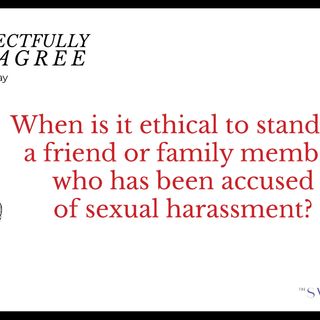
Is Commitment Phobia Real or Just the Plot of Every RomCom?
A bad past or troubled childhood can cause anxiety that prevents people from promising to be or staying in long relationships.

Two people meet, go on a couple of dates, everything seems to be going in the right direction, and they think it’s time to take the next step. But one of them tries to dodge the situation by saying commitment scares them. This kind of fear, of committing to and/or seeing through a relationship with another person, is popularly known as commitment phobia. But often, the other person is left wondering why a prospective partner would be scared to commit, or if they have already committed, whether they are giving their 100% to the relationship.
So, here’s trying to unpack the phenomenon and trying to understand why people behave the way they do.
Commitment phobics are not averse to relationships, according to John Grohol, Psy.D. and founder and editor-in-chief of Psych Central. Turns out, they do want a long-term connection with another person. “but it is their overwhelming anxiety that prevents them from staying in any relationship for too long,” Grohol writes for his publication. Although commitment phobics do experience love like anyone else, “… the feelings can be more intense and scary than they are for most people. These feelings drive increased anxiety, which builds upon itself and snowballs as the relationship progresses — and the expectation of a commitment looms larger.”
Therefore, if a commitment-phobic person is asked to act against their will to be in a relationship when they don’t want to, “they are far more likely to leave the relationship to make the commitment. Or, they may initially agree to the commitment, then back down, or weeks later, because of their overwhelming anxiety and fears,” Grohol writes.
So, why is their phobia limited only to relationships? True commitment phobia is about having difficulties making important decisions in all areas of life, Berit Brogaard, Ph.D., a professor of philosophy at the University of Miami, writes for Psychology Today. But, the catch is, it doesn’t come in the way of promising something that doesn’t involve people, for instance, buying a car or a house. “Their fear is usually connected with making a promise to another person,” she added.
Related on The Swaddle:
Understanding Phobias: What They Are and Why They Happen
That said, just like no two people are the same, neither are two commitment phobics. Their patterns might vary with regards to what they think about getting into a relationship, or if already in one, then the duration to stay.“Some refuse to have any serious or long-term relationships longer than a week or a month, because of their fears. Others may be able to be involved with one person for a few months, but as the relationship becomes more serious and deeper, their old fears again come to the forefront, driving the person away,” Grohol writes.
In other cases, commitment phobics can be identified by patterns of their previous relationship. Brogaard writes that these people’s past relationships may have been shortlived or non-committal. In current relationships, these people are the ones who may not be willing to promise dates weeks in advance. Even their use of words, such as using a lot of modifiers like “maybe,” “probably,” “I might,” “I might not,” can speak to their non-committal attitude towards the relationship. Not wanting to label a relationship, or not liking the use of words like boyfriend or girlfriend, can also be considered a symptom of commitment phobia. Some signs like not having a lot of friends, or being unpredictable, may also be red flags for a person being afraid of commitment.
However, “A person with commitment phobia need not display every one of the above symptoms, but the more symptoms he or she displays, the more likely it is that he or she suffers from the condition,” explains Brogaard.
If numbers are any evidence of why the term ‘commitment phobia’ is associated with millennials and gets tossed around in today’s times more than ever, a Pew Research Center survey showed that they are less likely to be married in their 20s than previous generations. Gallup, another research firm, concluded that in 2004, while 52% of 18- to 19-year-olds were single in 2004, 10 years later, in 2014, the number rose to 62%. The numbers also increased in the 30 to 39 age group, from 15% to 19% in the same decade.
Whether this is to do with commitment phobia or not is unclear, but experts like Grohol and Brogaard cite reasons such as having experienced a poor relationship previously or having known people who didn’t have pleasant experiences while in a relationship as two of the most common reasons for fearing commitment. Other possible reasons include the fear of being in a bad relationship or experiencing a troubled childhood. Childhood trauma or abuse, unmet childhood needs or having attachment issues, could also be contributing to developing non-committal behavior, according to Dr. Grohol. Complicated family dynamics may be another reason, he said. But from Grohol’s research, having trust issues also emerged to be one of the biggest problems driving their commitment-phobic behavior.
Another Pew survey might confirm their observations. The research found that just 19% of Millennials say most people can be trusted, compared with 31% of Gen Xers.
Related on The Swaddle:
What Is the Right Amount of Expectations from a Romantic Partner?
Love coach Jessica Bartram attributes the rising numbers to dating apps and social media. She told The Cusp, “With social media, we’re constantly bombarded with a ‘highlight reel’ of everyone’s life. We only observe the best of people and their relationships. In reality, there are positive and negative feelings and situations, so we’re constantly dealing with inadequacy and insecurity.”
Relationship counselor Hailee Walker added, “The #couplegoals leave us constantly questioning whether what we have is good enough or whether we’re settling. We forget that our Instagram and Facebook feeds are highly edited and filtered snapshots of life,” reported The Cusp.
With Gen Z, the problem is that they are coming of age at a time when they are spoilt for choice, thanks to the same dating apps and the advent of social media. “The excitement of something new is constantly at our fingertips,” said Bartram. “Too much choice is paralyzing; the more options we have, the more we fear we’ll make the wrong decision.”
But, all said and done, Grohol and Brogaard believe these problems can take a backseat, should commitment-phobics wish to be in a relationship. Counseling will help, says Grohol. Therapists can help a commitment-phobic person understand there is no “perfect” relationship, and that all relationships need nurturing, care and constant attention. “A person will also learn in therapy that open communication with their partner will reduce the likelihood of there being any future surprises or trust issues,” Grohol writes. No matter how severe an individual’s level of relationship anxiety, there is help for it, he adds. But if one recognizes themselves or partners to have milder commitment issues, they can be resolved on their own, writes Terry Gaspard, a licensed clinical social worker and a writer for Huffington Post.
The first step in tackling a fear of commitment could be to embrace the fact thatone might have to make some form of commitment when there is some degree of uncertainty. “If you wait to make a commitment when you are free of doubts, it will never happen,” Gaspard writes. She also advises commitment-phobic individuals to take their own time to figure out feelings while dating to ensure their partner has common values, which will help a couple be more comfortable with each other and leave little room for disagreement. “Remember to learn to trust your judgment and be consistent with your commitment. Commitment to someone you love and consider your best friend is not an on-again, off-again proposition,” she adds.
Anubhuti Matta is an associate editor with The Swaddle. When not at work, she's busy pursuing kathak, reading books on and by women in the Middle East or making dresses out of Indian prints.
Related


Respectfully Disagree: When Is It Ethical to Stand By a Friend or Family Member Accused of Sexual Harassment?
